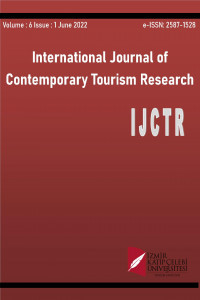Turist Rehberliği Bölümleri Ders Programlarının “Türk Kimliği” Açısından İncelenmesi
Turist Rehberliği, Eğitim, Türk Kimliği
Investigation of the Curricula of Tourist Guiding Departments in Terms of "Turkish Identity"
Tourist Guidance, Education, Turkish Identitiy,
___
- Cohen, E. (1985), The Tourist Guide: The Origins, Structure, And Dynamics Of A Role, Annals of Tourism Research, 12 (1): 5-29.
- Cohen, L. ve Manion, L. (2001). Research Methods in Education (5th Edition), New York: Rotledge Falmer
- Çakmak, Tolga Fahri (2018) Turizm Endüstrisinde Kriz Yönetimi: Turist Rehberleri Üzerine Bir Alan Araştırması, (Basılmamış Doktora Tezi) İstanbul Üniversitesi sosyal Bilimler Enstitüsü, İstanbul
- Dahles, H., (2002), “The Politics of Tour Guiding Image Management in Endonesia”, Annals of Tourism Research, 29 (3): 783-800.
- Değirmencioğlu, Ö. (1998), Türkiye’de Turizm Rehberliği Eğitimine Bir Yaklaşım, (Basılmamış Yüksek Lisans Tezi) Gazi Üniversitesi Sosyal Bilimler Ensistüsü, Ankara
- Eker, N., Zengin, B. (2016) Turist Rehberliği Eğitiminin Değerlendirilmesi: Profesyonel Turist Rehberleri Üzerinde Bir Uygulama, Eğitim ve Öğretim Araştırmaları Dergisi, 5(4): 65-74
- Holloway, J. C., (1981), “The Guided Tour: A Sociological Approach”, Annals of Tourism Research, 8(3): 377-402.
- İşçeli, Z., Kılıç, G. (2018) Lisans Düzeyinde Turizm Rehberliği Eğitimi Veren Fakültelerin Müfredatlarının İncelenmesi, Turist Rehberliği Dergisi (TURED) 1(1): 41-56
- Leblebici, D. N., Kılıç, M., (2004), İçerik Analizi, Ankara: Hacettepe Üniversitesi İ.İ.B.F. Yayınları.
- Suri, H. ve Clarke, D. (2009). Advancements in Research Systhesis Methods: From a Methodologically Inclusive Perspective, Review of Educational Research, 79(1): 395-430.
- Tuader; http://www.tuader.org/turizm-akademisyenleri-derneginden-2018-yks-turizm-egitimi-raporu/ (15.09.2018)
- Weber, P. W., (1990). Basic Content Analysis, 2nd ed., California: Sage Publications
- WFTGA, http://www.wftga.org/tourist-guiding/what-tourist-guide (23.08.2018)
- Yenipınar, U., Zorkirişçi A. (2013), Türkiye ve Avrupa Birliği Ülkelerinde Turist Rehberliği Eğitimi, Çağ Üniversitesi sosyal Bilimler Dergisi, 10 (2), ss: 111-136
- Yök Atlas, https://yokatlas.yok.gov.tr/ (18.10.2018)
- Zhang, Hanguin Q. ve Chow, Ivy (2004) , Application of Importance – Performance Model in Tour Guides’ Performance: Evidence From Mainland Chinese Outbound Visitors in Hong Kong, Tourism Management, 25: 81-91.
- 3. Turizm Şurası, http://turizmsurasi.kulturturizm.gov.tr/TR-204583/turizm-egitimi-istihdami-ve-turist-rehberligi-komisyonu-.html (18.10.2018)
- Başlangıç: 2016
- Yayıncı: İzmir Katip Çelebi Üniversitesi
Turist Rehberliği Bölümleri Ders Programlarının “Türk Kimliği” Açısından İncelenmesi
Tolga Fahri ÇAKMAK, Füsun İSTANBULLU DİNÇER
Developing Tourism in Foça: Views of Undergraduate Students
Otel İşletmelerinde Kurumsal Sosyal Sorumluluk Uygulamaları: Kuşadası Örneği
Yeşim GÜL ÖZDOĞAN, Osman Eralp ÇOLAKOĞLU
A Strategic Performance Management Framework: A Hypothetical Hotel Case
Corporate Image, Brand and Reputation Concepts and Their Importance for Tourism Establishments
Turizm Sektöründeki Çevresel Sürdürülebilirlik Yatırımlarının Finansmanı, Muğla İli Örneği
Erkan POYRAZ, Bilge TÜRKÜN KAYA
Reflections of Industry 4.0 To Management of Service Enterprises: Smart Hotels
A Criticism Of Contemporary Mass Tourism By Historical Analogic Approach
